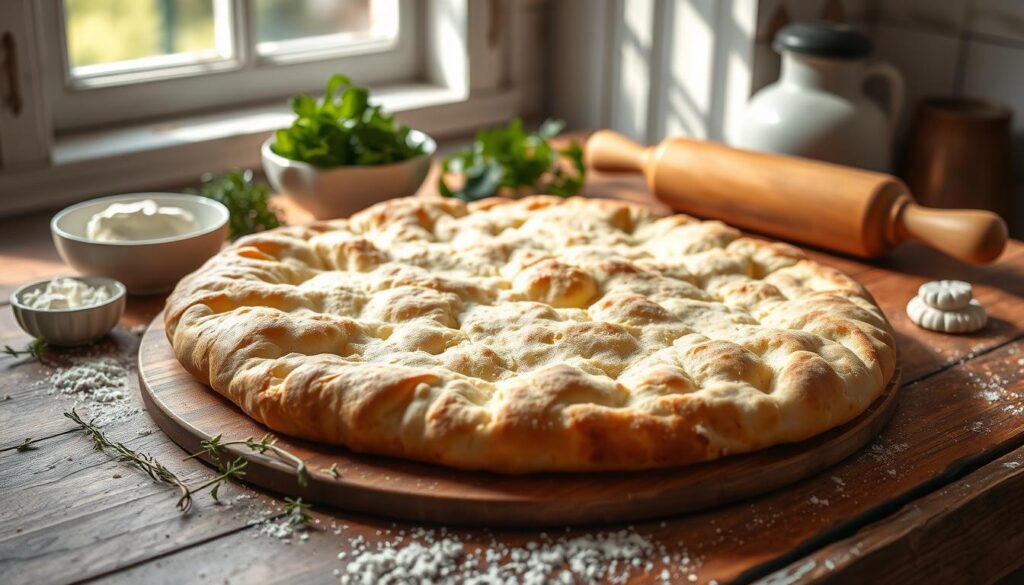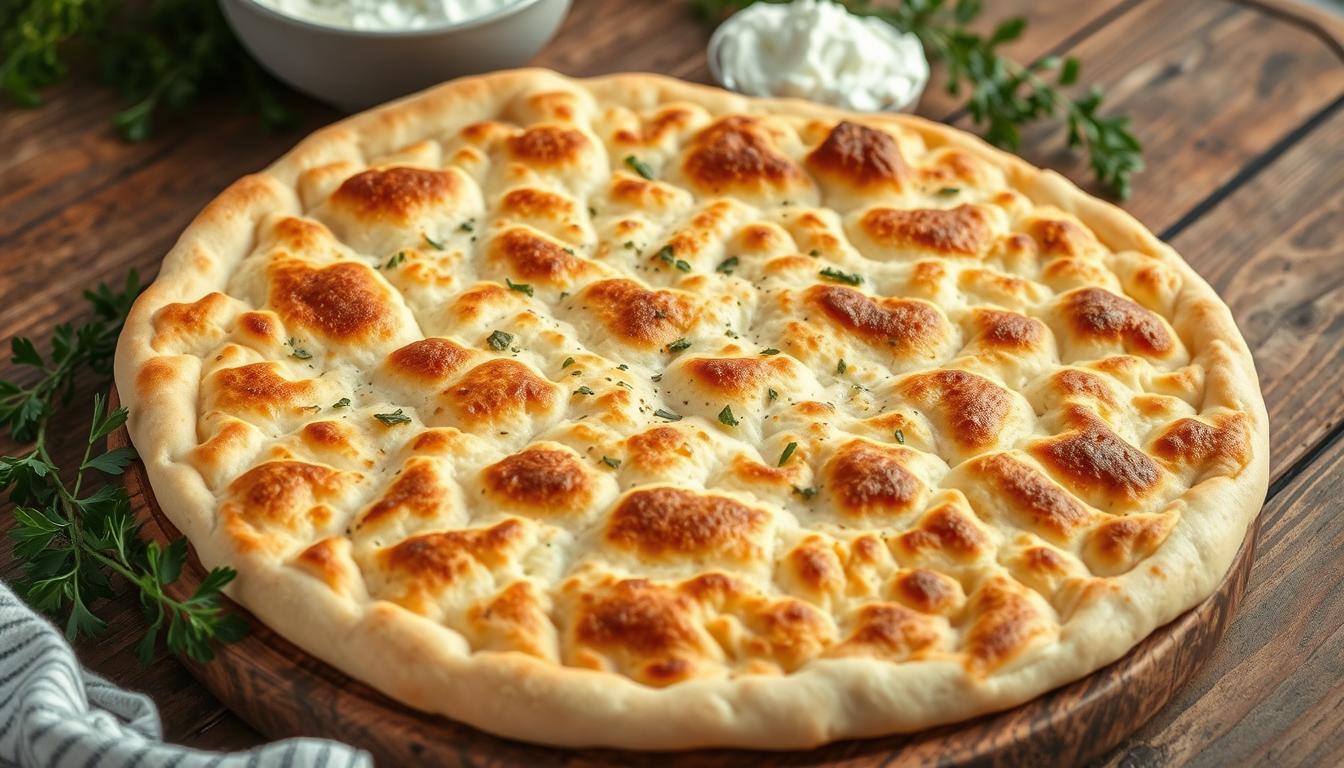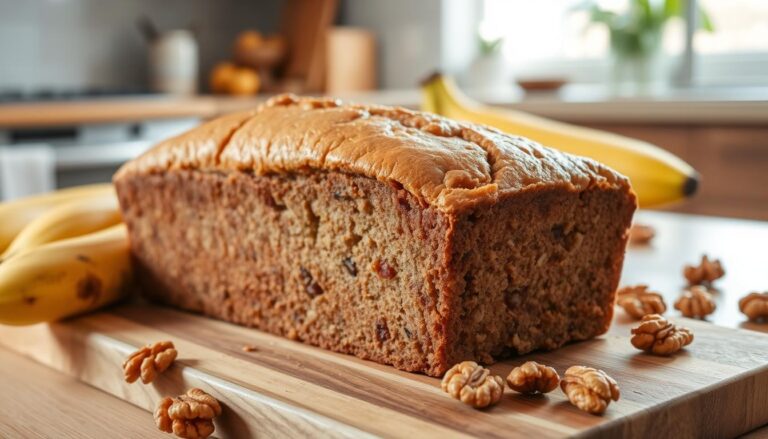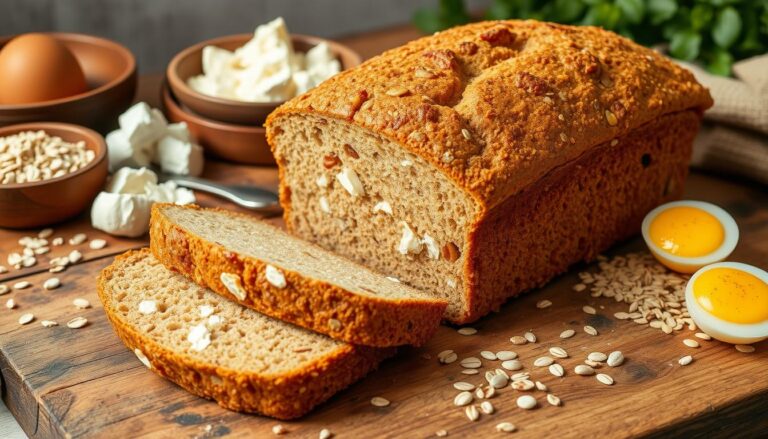Cottage Cheese Flatbread Recipe: Easy and Healthy
Table of Contents
Cottage cheese bread recipe
As a busy working mom, I’m always searching for quick, healthy meals. That’s why I’m excited to share this amazing cottage cheese flatbread recipe. It only needs two main ingredients and takes 35 minutes to prepare. This flatbread is perfect for busy weeknights or relaxing weekend brunches.
This recipe stands out because it’s gluten-free, grain-free, and nut-free. It’s also packed with nutrients. The cottage cheese offers high-quality protein, and the eggs make the dough rich and hold it together well. Once you try this homemade flatbread, you’ll love its easy and healthy taste.
Looking for a savory wrap, a crisp pizza crust, or a simple slice for dipping? This cottage cheese flatbread recipe is your go-to. Let’s explore how simple it is to make this tasty, protein-rich dish in your kitchen.
What is Cottage Cheese Flatbread?
Cottage cheese flatbread is a tasty and healthy twist on regular flatbread. It mixes cottage cheese’s protein with flatbread’s flexibility. This makes a bread that’s both high in protein and gluten-free. Unlike usual flatbreads, it uses cottage cheese and eggs, making it flavorful and filling.
Overview of Cottage Cheese
Cottage cheese is a favorite dairy item for its protein and creamy feel. It’s made by curdling milk and then separating the curds from the whey. With about 12 grams of protein per half-cup, it’s a great source of protein. It also has calcium, phosphorus, and other important vitamins and minerals.
History of Flatbread
Flatbread has been a key food for centuries, found in many cultures. Traditional flatbreads are made from wheat flour, water, and sometimes yeast, salt, and herbs. The simple nature of flatbread has let it change and meet different dietary needs, like the cottage cheese flatbread.
Nutritional Benefits of Cottage Cheese
Cottage cheese is packed with high-quality protein, making it a top pick for more protein. The cottage cheese flatbread recipe in this article provides about 39 grams of protein per serving, making it a nutritious and filling choice. It’s also low in carbs, making it good for those on low-carb or keto diets.
“Cottage cheese flatbread is a game-changer for anyone looking to add more protein to their diet in a delicious and versatile way.”
Ingredients You’ll Need
To make tasty cottage cheese flatbread, you’ll need a few basic ingredients. The main ingredients are cottage cheese and eggs. You can also add different seasonings and toppings to change the flavor.
Core Ingredients List
- 1 cup of cottage cheese (full-fat, reduced-fat, or fat-free)
- 2 large whole eggs
Optional Additions and Variations
To make your cottage cheese flatbread even better, try adding these:
- 3/4 teaspoon of garlic powder
- 1 teaspoon of Italian seasoning
- Taco seasoning mix
- Cajun seasoning
- Crushed red pepper
- Onion powder
- Curry powder
- Ground mustard
- Paprika
- Chopped fresh herbs (parsley, chives, basil, oregano)
- 2 tablespoons of grated Parmesan cheese
This Cottage cheese bread recipe is very versatile. You can try different spice mixes and toppings to make it your own.
“The recipe is described as gluten-free, grain-free, and nut-free, making it a suitable option for those with dietary restrictions.”
With just a few ingredients, you can make a batch of delicious, protein-rich no-yeast flatbread. It’s great for a quick snack or a filling vegetarian flatbread meal.
Equipment Required for Making Flatbread
To make tasty cottage cheese flatbread at home, you’ll need some basic kitchen tools. First, a food processor or blender is needed to mix the ingredients. A baking sheet, about a quarter or half sheet size, is the cooking surface. Use parchment paper on the baking sheet for easy clean-up.
Remember to have cooking spray ready to grease the parchment paper. An oven is key for baking the flatbread, usually at 350°F (176°C). Some recipes suggest using an air fryer as an alternative. A spatula is useful for spreading the batter evenly on the baking sheet.
Essential Cooking Tools
- Food processor or blender
- Baking sheet (quarter or half sheet size)
- Parchment paper
- Cooking spray
- Oven or air fryer
- Spatula
Recommended Cooking Surface
For the best results, use a baking sheet to make cottage cheese flatbread. The parchment paper ensures even heat and prevents sticking. This helps the flatbread cook evenly and release easily.
This setup gives you a crispy outside and a soft, chewy inside. It’s perfect for achieving the right texture in your easy flatbread recipe.
| Equipment | Recommended Use |
|---|---|
| Baking Sheet | Ideal for evenly baking the homemade flatbread |
| Parchment Paper | Prevents sticking and ensures easy release of the easy flatbread recipe |
| Oven | Bakes the cottage cheese flatbread to perfection |
| Air Fryer | Offers an alternative cooking method for the flatbread |
Step-by-Step Instructions for Preparation
Making the perfect homemade flatbread with cottage cheese is easy. Just follow these simple steps. You’ll get a tasty and easy flatbread recipe that’s full of protein.
Preparing the Dough
Begin by mixing cottage cheese, eggs, and seasonings like oregano and garlic powder. Blend until smooth and creamy. This mix gives your flatbread a tangy taste and lots of protein. Each serving has 25 grams of protein.
Rolling Out the Flatbread
Put parchment paper on a baking sheet and grease it lightly. Spread the cottage cheese mix on the sheet. Aim for a 1/4-inch thickness for a crispy flatbread. For a thicker version, go up to 1/2-inch.
Cooking the Flatbread
Preheat your oven to 350°F (176°C). Bake the flatbread for 30-35 minutes for a thin version. For a thicker one, bake up to 50 minutes. It’s done when the edges are golden brown. Let it cool before adding toppings.
With just a few ingredients, you can make a delicious, protein-rich flatbread. Try different toppings to make it your own!
| Ingredient | Amount |
|---|---|
| Cottage Cheese | 3/4 cup (2% fat) |
| Eggs | 1 |
| Oregano | 1 tsp |
| Garlic Powder | 1 tsp |
This Cottage cheese bread recipe has 283kcal per serving. It has 14g of carbs, 14g of fat, and 25g of protein.

Creative Toppings for Cottage Cheese Flatbread
Cottage cheese flatbread is a blank canvas for many toppings. You can choose from savory or sweet options. The choices are endless for customizing your flatbread.
Popular Topping Ideas
- Turkey and cheese with lettuce and tomato
- Avocado with smoked salmon
- Pizza-style with marinara sauce and mozzarella
- Hummus with cucumber, bell peppers, and spinach
- Kalamata olives, cucumbers, feta cheese, and grilled chicken for a Greek-inspired twist
Seasonal Variations
Adding fresh, seasonal produce boosts flavor and nutrition. In summer, try juicy tomatoes, zucchini, and fresh basil. For fall and winter, roasted butternut squash, cranberries, and toasted pecans are great. Seasonal ingredients make your cottage cheese flatbread unique and satisfying all year.
“The beauty of cottage cheese flatbread is its ability to serve as a blank canvas for your culinary creativity. With a little imagination, you can transform it into a healthy and delicious meal that suits your taste preferences.”
Serving Suggestions
The cottage cheese flatbread is great in many ways. Try it with creamy dips like hummus or tangy Greek yogurt. You can also add pesto for a tasty snack or light meal. It’s perfect as a base for sandwiches or wraps, filled with tuna, egg salad, or grilled chicken.
Make a low-carb pizza by topping it with pizza sauce, cheese, and veggies or lean meats. Just bake it for a few minutes to melt the cheese. Serve it with soups or salads for a filling side dish.
| Serving Suggestion | Nutritional Benefits |
|---|---|
| Cottage Cheese Flatbread with Hummus | High in protein, fiber, and healthy fats |
| Cottage Cheese Flatbread with Grilled Chicken and Veggies | Provides a balance of lean protein, complex carbs, and essential vitamins and minerals |
| Cottage Cheese Flatbread as a Low-Carb Pizza Base | Satisfies pizza cravings while keeping carbs and calories in check |
Whether you serve it with dips, as a sandwich, or as a pizza base, the cottage cheese flatbread is a healthy choice. Try different toppings and sides to find your favorite way to enjoy it.
Storage Tips for Leftover Flatbread
Enjoy the delicious taste of homemade cottage cheese flatbread, but don’t let those leftover slices go to waste. With proper storage techniques, you can extend the life of your easy flatbread recipe and enjoy it for days to come.
How to Refrigerate Cottage Cheese Flatbread
To store leftover cottage cheese flatbread, place the slices between two sheets of parchment paper on a large plate or baking sheet. Avoid storing the flatbread in an airtight container, as this can lead to sogginess. Instead, keep the container slightly open to allow for air circulation. Refrigerate the flatbread for up to 48 hours, and when ready to enjoy, simply reheat it in an air fryer set to 350°F (176°C) for 1-2 minutes.
Freezing Instructions for Cottage Cheese Flatbread
While refrigeration is the best storage method for cottage cheese flatbread, freezing is not recommended. The freeze-thaw cycle can negatively impact the texture of the flatbread, making it less appealing. For the best results, aim to consume the cottage cheese flatbread within 1-2 days of preparation.
By following these simple storage tips, you can savor the delightful flavors of your homemade cottage cheese flatbread long after the initial preparation. Enjoy this high-protein, gluten-free bread alternative as a versatile base for a variety of toppings and fillings.
Common Mistakes to Avoid
Making the perfect cottage cheese flatbread needs careful attention. As you start this tasty journey, watch out for common mistakes. This way, your homemade flatbread will be perfect every time.
Overmixing the Dough
Mixing the dough right is key. Don’t overwork it, or your flatbread might end up tough. Mix the ingredients just until they stick together. This way, you avoid a chewy texture.
Cooking Temperature Tips
Getting the cooking temperature just right is crucial. It helps your flatbread get that golden-brown color and crispy texture. Keep an eye on them while they bake. Adjust the temperature to avoid burning or undercooking.
By following these tips, you’ll get better at making cottage cheese flatbread, homemade flatbread, and easy flatbread recipe. Share your delicious creations with family and friends. Enjoy the fruits of your labor.

Frequently Asked Questions
Have you wondered about the cottage cheese flatbread recipe? You’re not alone. Let’s clear up some common questions. This will help you make a gluten-free, long-lasting flatbread.
How to Make It Gluten-Free?
The good news is the Cottage cheese bread recipe is naturally gluten-free. It doesn’t have flour. To keep it gluten-free, avoid cross-contamination. Use only gluten-free seasonings and ingredients.
This way, you can enjoy a tasty and healthy flatbread without gluten worries.
How Long Does It Last?
The cottage cheese flatbread is best eaten fresh. But, it can stay in the fridge for up to 48 hours. Freezing is not recommended as it changes the texture and quality.
For longer storage, make smaller batches. Or eat the flatbread within a couple of days for the best taste and texture.


